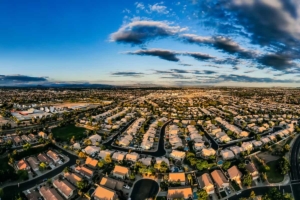The consumer price index for rent prices in the Metro Phoenix area has increased by 10% from August 2022 to August 2023, according to the United States Bureau of Labor Statistics.
MORE NEWS: Here are hottest zip codes in Metro Phoenix for apartment construction
The consumer price index, or CPI, is the average change over time for prices paid by consumers in an area. Any CPI over 100 is equated with a rise in the inflation rate since 1984. In Phoenix in August of 2022, the CPI of rent was around 213. In August of 2023, it was about 234.
Mark Stapp is the Fred E. Taylor Professor of Real Estate at Arizona State University. He said that a large percentage of new single-family homes were under construction in 2019, but, by the time they were finished, and put on the market, constraining factors like COVID-19 and raised interest rates deterred investors from further investment in single-family home construction.
“Our demand continues to increase because we continue to grow as a place that’s pushing demand and the single-family housing market is highly constrained,” Stapp said. “By either choice or necessity apartments become where you go and what we’re going to see now is the effect of all these units being absorbed into the market, a lack of significant new inventory added, and you’re going to see prices continue to push upward.”
Stapp’s prediction of apartment rental price increases is having an impact on areas in the Valley where there is a high percentage of ASU students.
Phoenix resident Anna Snow, 22, moved into The Met at 3rd and Fillmore in 2021 when she was a sophomore at Arizona State University. She and a friend rented a two-bedroom apartment for a year that cost $2,000 per month. Snow partially financed her rent with family funds, but after a year, her roommate moved out, forcing her to find a one-bedroom apartment in June 2022 leading to sticker shock.
“When I had a two bedroom, I was paying a little over a thousand dollars for my half and so it was around two thousand dollars total, somewhere around that ballpark,” Snow said. “But when I downsized to the one-bedroom they actually raised all the rents up around that same time. I pay about $2,000 a month now for a one-bedroom, which because of the increase is about the same total that two of us were paying for a two-bedroom.”
Tempe resident Jude McGee, 19, rents through an apartment complex that works with ASU to help students find affordable housing. This is not university housing, but ASU is affiliated with the complexes and promotes them to students.
McGee noticed an increase in his rent when he received his re-signing agreement this past October.
“The re-signing deals come out around early October and I saw that they raised our rent $400,” McGee said. “And so I was not happy about that. I mean, $50 or $100 [increase] is whatever, but $400 is insane. Almost every one of the other apartments in the area raised their rent.”
McGee began renting his apartment at the beginning of this year, his sophomore year at ASU. He previously lived at the dorms in Tempe for his freshman year but looked at apartments when there was no available university housing for upperclassmen on campus.
Even though the rental increase was steep, McGee decided to re-sign his lease before his rent agreement got any higher.
“What they [the apartment owners] do is they start the year, they start opening up leases, and they get the cheapest rate in October when they open it up,” McGee said. “And then as some sort of incentive to fill up the spots, by the time it gets to February the prices go up, so it could be like if you sign in November you could get $1,000 rent versus if you sign in February it might be up to $1,500.”
The average price of rent in Phoenix in 2023, $1,310 per month, would have been about $1,246 in 2022. This might not seem like much of a difference, but for residents of Phoenix on tight budgets, the $64 difference can be a strain on other needs such as food or transportation.
Professor Stapp believes that the biggest risk that comes from rental inflation is not whether residents will be able to afford rent, but what the impact on their quality of life will be.
“What we don’t want to do is have people pay out of necessity, but be so overburdened that it creates a risk to them in terms of their ability absorb shocks in their life and have a sustainable quality lifestyle,” Stapp said. “We may continue to see people able to pay these, but it’s putting increasing pressure on them and that is not a situation we want as an overall community.”




